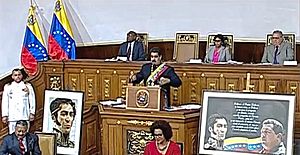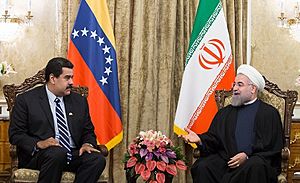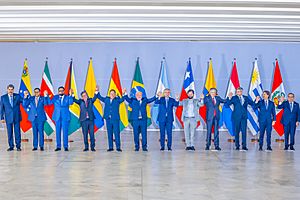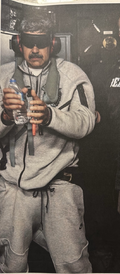Nicolás Maduro facts for kids
Quick facts for kids
Nicolás Maduro
|
|||||||||||||||||||||||||||||
|---|---|---|---|---|---|---|---|---|---|---|---|---|---|---|---|---|---|---|---|---|---|---|---|---|---|---|---|---|---|
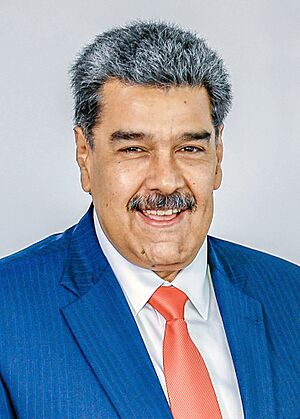
Maduro in 2023
|
|||||||||||||||||||||||||||||
| President of Venezuela |
|||||||||||||||||||||||||||||
| In office 5 March 2013 – 3 January 2026 |
|||||||||||||||||||||||||||||
| Vice President |
See list
Himself
(Mar–Apr 2013) Jorge Arreaza (2013–2016) Aristóbulo Istúriz (2016–2017) Tareck El Aissami (2017–2018) Delcy Rodríguez (2018–present) |
||||||||||||||||||||||||||||
| Preceded by | Hugo Chávez | ||||||||||||||||||||||||||||
| Succeeded by | Delcy Rodríguez (acting; disputed) | ||||||||||||||||||||||||||||
| President of the United Socialist Party of Venezuela | |||||||||||||||||||||||||||||
| Assumed office 5 March 2013 |
|||||||||||||||||||||||||||||
| Vice President | Diosdado Cabello | ||||||||||||||||||||||||||||
| Preceded by | Hugo Chávez | ||||||||||||||||||||||||||||
| Vice President of Venezuela | |||||||||||||||||||||||||||||
| In office 13 October 2012 – 19 April 2013 |
|||||||||||||||||||||||||||||
| President |
|
||||||||||||||||||||||||||||
| Preceded by | Elías Jaua | ||||||||||||||||||||||||||||
| Succeeded by | Jorge Arreaza | ||||||||||||||||||||||||||||
|
|||||||||||||||||||||||||||||
|
|||||||||||||||||||||||||||||
| Personal details | |||||||||||||||||||||||||||||
| Born |
Nicolás Maduro Moros
23 November 1962 Caracas, Venezuela |
||||||||||||||||||||||||||||
| Political party | PSUV (since 2007) | ||||||||||||||||||||||||||||
| Other political affiliations |
MVR (until 2007) | ||||||||||||||||||||||||||||
| Spouses |
|
||||||||||||||||||||||||||||
| Children | Nicolás Maduro Guerra | ||||||||||||||||||||||||||||
| Residence | Miraflores Palace | ||||||||||||||||||||||||||||
| Occupation |
|
||||||||||||||||||||||||||||
| Signature |  |
||||||||||||||||||||||||||||
Nicolás Maduro Moros (born 23 November 1962) is a Venezuelan politician who served as the president of Venezuela from 2013 until 3 January 2026. Before becoming president, he was a trade union leader and held several important government roles. He served as the vice president under President Hugo Chávez from 2012 to 2013. He was also the minister of foreign affairs from 2006 to 2012.
Maduro started his career as a bus driver and became a union leader. He was elected to the National Assembly in 2000. As a member of the United Socialist Party (PSUV), he held positions like President of the National Assembly and Minister of Foreign Affairs. He became vice president under Hugo Chávez. After Chávez's death, Maduro became president and won a special election in 2013.
During his presidency, Venezuela faced economic challenges and political disagreements. There were public demonstrations and concerns about the country's direction. Maduro was reelected in 2018, but this election was met with criticism from many countries. In 2024, he sought a third term. The official election results, which stated he won, were questioned by many. The opposition presented their own vote counts showing their candidate, Edmundo González, as the winner. This led to more political disagreements.
On 3 January 2026, United States forces took Maduro and his wife into custody. They are currently being held in the United States.
Contents
Early Life and Family
Nicolás Maduro Moros was born on 23 November 1962 in Caracas, Venezuela. He grew up in a working-class family. His father, Nicolás Maduro García, was a well-known trade union leader. His mother, Teresa de Jesús Moros, was from Cúcuta, a town in Colombia near the Venezuelan border. Maduro was raised in a working-class neighborhood in Caracas. He was the only boy among four siblings, having three sisters.
Maduro was raised in the Catholic faith. In a 2013 interview, he mentioned that his grandparents had a Sephardic background and later converted to Catholicism in Venezuela.
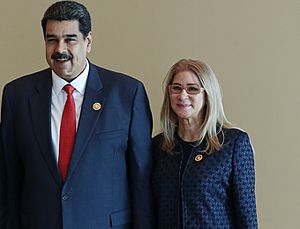
Maduro has been married twice. His first wife was Adriana Guerra Angulo. They had one son, Nicolás Maduro Guerra, who is also known as "Nicolasito." Nicolasito has held several government positions and is a member of the National Assembly of Venezuela.
In July 2013, Maduro married Cilia Flores. She is a lawyer and politician. Cilia Flores became the president of the National Assembly after Maduro left that role in 2006. She was the first woman to hold this position. Maduro and Flores had been together since the 1990s. They married a few months after Maduro became president.
Maduro is a fan of John Lennon's music. He also enjoys the music of Robert Plant and Led Zeppelin. He has said he was inspired by the music and culture of the 1960s and 70s.
Early Career and Political Beginnings
Education and Union Work
Maduro attended a public high school called Liceo José Ávalos. His first experience in politics was as a member of his high school's student union. School records show that Maduro did not graduate from high school.
For many years, Maduro worked as a bus driver for the Caracas Metro company. He helped start an unofficial trade union there, even though unions were not allowed at the time.
At age 24, Maduro studied in Havana, Cuba. He attended a political training center for one year.
Joining the MBR–200
In the early 1990s, Maduro joined the MBR-200. He worked to support Hugo Chávez when Chávez was in jail. Chávez was imprisoned for his role in the 1992 Venezuelan coup d'état attempts. In the late 1990s, Maduro helped create the Fifth Republic Movement. This party supported Chávez when he ran for president in 1998.
Serving in the National Assembly
Maduro was elected to the Venezuelan Chamber of Deputies in 1998. He then served in the National Constituent Assembly in 1999. Finally, he was elected to the National Assembly in 2000. He represented the Capital District in all these roles. From 2005 to 2006, he was the president of the National Assembly of Venezuela.
Foreign Minister of Venezuela
In 2006, Maduro was appointed Minister of Foreign Affairs. He served in this role under President Chávez until October 2012. He then became Vice President of Venezuela. During his time as foreign minister, Maduro worked to build relationships with many countries around the world. He especially focused on countries that had different views from the United States.
Venezuela's foreign policy under Maduro included ending relations with Taiwan to favor the People's Republic of China. It also involved supporting Libya and breaking diplomatic ties with Israel during a conflict. Venezuela recognized and established diplomatic relations with the State of Palestine. Relations with Colombia improved at times. Venezuela also recognized Abkhazia and South Ossetia as independent states. Maduro's government also supported Bashar al-Assad during the Syrian Civil War.
Vice President of Venezuela
In 2011, President Chávez chose Maduro as a potential successor if he were to die from cancer. Chávez made this choice because Maduro was very loyal to him. Maduro also had good relationships with other important political figures.
On 13 October 2012, Chávez appointed Maduro as Vice President of Venezuela. This happened shortly after Chávez won the presidential election that month. On 8 December 2012, Chávez announced that his cancer had returned. He said he would go to Cuba for surgery and medical treatment. Chávez publicly stated that if his condition worsened and a new election was needed, Venezuelans should vote for Maduro to become president. This was the first time Chávez named a possible successor.
Becoming Interim President
When Hugo Chávez died on 5 March 2013, Maduro took on the duties of the president. He then appointed Jorge Arreaza as the new vice president. Because Chávez died within the first four years of his term, the Constitution of Venezuela required a presidential election to be held within 30 days. Maduro was chosen as the Socialist Party's candidate for this election.
Presidency
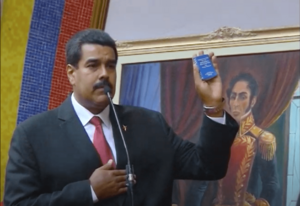
Maduro was elected president in April 2013. He won by a small margin against the opposition candidate, Henrique Capriles. Capriles asked for a recount, but Maduro was inaugurated as president on 19 April. In October 2013, Maduro announced the creation of a new government office called the Vice Ministry of Supreme Happiness. This office was meant to help coordinate social programs.
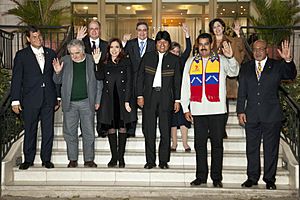
During his time as president, Venezuela faced economic challenges. There were also public demonstrations and political disagreements. In 2015, an opposition-led National Assembly was elected. A movement to hold a special vote to remove Maduro from office began in 2016, but it was stopped by the government. The Supreme Court made decisions that reduced the power of the elected National Assembly, leading to further political disagreements and protests. In response, Maduro called for a new assembly to rewrite the constitution, which was elected in 2017. Many people questioned the fairness of this election.
Maduro was reelected in 2018. This election was met with criticism from many countries. The head of the National Assembly, Juan Guaidó, was recognized by some countries as the interim president, leading to a period of political uncertainty.
Maduro was given special powers to make laws without the National Assembly. He said this was to help with economic problems. This decision was criticized by the opposition. During his time, Venezuela faced many economic difficulties, including rising prices and poverty. Experts had different ideas about why this happened, with some pointing to government policies and others to outside influences.
A report in 2018 raised concerns about human rights in Venezuela. The government launched operations to address crime, which led to many arrests and concerns about how these operations were carried out. The United Nations also expressed concerns about these operations. Government officials acknowledged some issues but defended the need for the operations, stating they aimed to protect human rights. The Venezuelan government disagreed with the UN's report, calling it unfair.
In August 2018, there was an incident involving drones with explosives near where Maduro was speaking. The government called it an assassination attempt, but others questioned what truly happened.
After other countries placed economic restrictions on Venezuela in 2019, the government changed some of its economic policies, which helped the country's economy improve a little.
International Relations
In March 2014, Maduro announced that Venezuela was ending diplomatic and business relations with Panama. This was after Panama's president supported demonstrators during protests in Venezuela. Relations were later restored in July 2014.
In August 2017, US President Donald Trump said he would consider a "military option" to deal with Maduro's government. In January 2019, Maduro announced that Venezuela was breaking ties with the United States. This happened after President Trump recognized Juan Guaidó as the interim President of Venezuela.
Another diplomatic disagreement with Panama happened in 2018. The Panamanian government placed restrictions on Maduro and other Venezuelan officials. Venezuela responded by placing similar restrictions on Panamanian companies and officials. This disagreement ended in April 2018, and ambassadors returned to both countries.
In January 2019, Maduro criticized Brazilian President Jair Bolsonaro.
Maduro developed a close partnership with Russian leader Vladimir Putin.
In November 2022, at a climate change conference, several world leaders spoke with Maduro. These included French President Emmanuel Macron and Portuguese Prime Minister António Costa. Days later, the United States eased some restrictions on Venezuela. This allowed Chevron Corporation to work with the Venezuelan government for a short time.
Maduro visited Saudi Arabia in June 2023. He also visited China in September 2023. During his China visit, he asked for China's support for Venezuela to join the economic group BRICS. He also wanted China to invest more in Latin America and the Caribbean. Brazil's president, Lula da Silva, supported Maduro's request to join BRICS. Maduro also signed an agreement for training Venezuelan astronauts, hoping to send Venezuelans to the Moon.
Maduro often supported the Palestinian cause in international discussions. In November 2023, he criticized Israel's actions in the Gaza Strip during the Gaza war.
Maduro promoted a referendum in Venezuela in 2023. This vote was to support Venezuela's claim to the Essequibo region, which is disputed with Guyana. The referendum took place on 3 December 2023. A large majority voted in favor of Venezuela's claims, though not many people participated in the vote. This referendum was one reason for the Guyana–Venezuela crisis.
In June 2025, Maduro criticized Israeli attacks on Iran. He called it a "criminal assault" that went against international law.
Capture and detention
In the early morning of 3 January 2026, the United States launched a military operation in Venezuela. U.S. President Donald Trump announced that Maduro and his wife were captured and flown out of the country. Secretary of State Marco Rubio stated that Maduro would face legal proceedings in the United States.
Maduro and his wife were first taken to the USS Iwo Jima (LHD-7) and then flown to the United States. They arrived at Stewart Air National Guard Base in Upstate New York on the same day. He is currently being held at the Metropolitan Detention Center, Brooklyn.
Maduro was taken into federal custody to face legal proceedings in the Southern District of New York. On 5 January 2026, Maduro and his wife appeared in court. They both stated they were not guilty of the charges.
Awards and Honors
Revoked and returned awards and honours.
| Awards and orders | Country | Date | Place | Notes | |
|---|---|---|---|---|---|
| Order of the Liberator | 19 April 2013 | Caracas, Venezuela | Highest decoration of Venezuela, given to every president. | ||
| Order of the Liberator General San Martín (Revoked) | 8 May 2013 | Buenos Aires, Argentina | Highest decoration of Argentina awarded by political ally President Cristina Fernández de Kirchner. Revoked on 11 August 2017 by President Mauricio Macri for human rights violations. | ||
| Order of the Condor of the Andes | 26 May 2013 | La Paz, Bolivia | Highest decoration of Bolivia. | ||
| Bicentenary Order of the Admirable Campaign | 15 June 2013 | Trujillo, Venezuela | Venezuelan order. | ||
| Star of Palestine | 16 May 2014 | Caracas, Venezuela | Highest decoration of Palestine. | ||
| Order of Augusto César Sandino | 17 March 2015 | Managua, Nicaragua | Highest decoration of Nicaragua. | ||
| Order of José Martí | 18 March 2016 | La Habana, Cuba | Cuban order. | ||
| Order of Francisco Morazán | 28 January 2024 | Tegucigalpa, Honduras | Highest decoration of Honduras. | ||
Other Recognitions
- In 2014, TIME magazine named Maduro as one of the 100 Most Influential People. The article suggested that Venezuela's future depended on Maduro's ability to lead and work with his opponents.
- In 2016, Reporters Without Borders (RSF) listed Maduro as a "predator" of press freedom in Venezuela. RSF noted concerns about censorship and economic pressure on media organizations.
- In 2016, the Organized Crime and Corruption Reporting Project (OCCRP) gave President Maduro their Person of the Year Award. This award recognizes individuals who have significantly advanced organized criminal activity and corruption. The OCCRP stated that they chose Maduro due to his leadership, which they said led to citizens facing hardship. They also mentioned concerns about government funds and political power.
See also
 In Spanish: Nicolás Maduro para niños
In Spanish: Nicolás Maduro para niños
 | Jessica Watkins |
 | Robert Henry Lawrence Jr. |
 | Mae Jemison |
 | Sian Proctor |
 | Guion Bluford |


